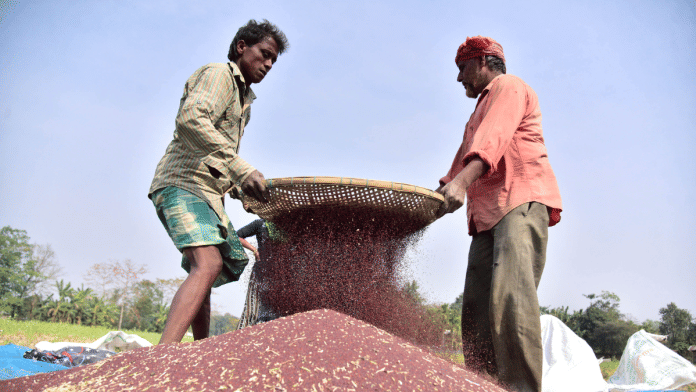Gurugram: The Haryana Seed Producers Association has halted the supply of seeds in protest against the amendments to the Seeds Act 1966, saying that it was a “conspiracy” that could create “unnecessary conflicts” with farmers.
The decision was taken Wednesday at a state-level meeting in Hisar, wherein seed producers expressed grave concerns over the new provisions that make offences under the Act non-bailable and cognizable.
A rally is also scheduled at Kurukshetra on 6 April wherein seed producers and traders from other states will participate with their Haryana counterparts. The association has also approached the National Seed Association of India (NSAI) to halt the sale of seeds across the country till amendment was taken back.
Last month, the Nayab Saini-led government passed the Seeds (Haryana Amendment) Bill 2025 during the budget session of the assembly last month. The amendment, which introduces Section 19-A, significantly increases penalties for seed producers and dealers.
Earlier, minor civil offenses drew a nominal fine of Rs. 500 or a maximum imprisonment of one month. Under the revised law, there is a provision of imprisonment of one to two years, extending up to three years for repeat offenders for preventing the production and sale of substandard or fake seeds. Similarly, the fine has been escalated to Rs. 1-3 lakh per offence.
In a memorandum, the association has urged Haryana Chief Minister Nayab Singh Saini to revoke the amendments, calling it a conspiracy that could create unnecessary conflicts with farmers.
Pal Singh Dhaliwal, president of the Haryana Seeds Producers Association, and owner of the Dhaliwal Seeds Private Limited, Kurukshetra, said that Haryana was known countrywide for its quality seeds. However, the recent amendment has posed a threat to the seed producers and traders in the state.
“Haryana had over 10,000 seed traders and 500 big producers, besides some smaller ones, and all have joined the association’s decision to halt the supply of seeds,” he told The Print.
He said that the amendment was in contradiction to the spirit of the ‘ease of doing business’ under which the Central government passed the Jan Vishwas Act 2023, which aims to decriminalise minor offences and promote trust-based governance.
Dhaliwal emphasised that seed production is a highly regulated process, with multiple layers of government oversight, including certification and laboratory testing. Holding seed producers criminally liable for factors beyond their control—such as improper storage by dealers or environmental conditions affecting germination—would be unjust, he added.
“As producers, we purchase principal seeds from the government agencies like CCS Haryana Agriculture University, Hisar, Punjab Agriculture University, Ludhiana, PUSA Institute of the Indian Council of Agriculture Research, Delhi or Directorate of Wheat Research (DWR), Karnal, based on whose variety it is. After this, we grow the crop under the supervision of the scientists of the Haryana Seed Certification Agency. The product is tested at various stages before it is allowed to be packed for supply,” he explained.
Under the new provision, germination of seeds below 80 percent will now draw heavy fines as well as imprisonment.
“There can be several reasons for loss of germination. Every crop has particular weather conditions to grow; the germination depends on the conditions under which the seed was sown. Further, every seed has its dormancy. If a particular seed is not giving proper germination, the farmer comes to know in three days and he can sow the seeds again. At best, it is a financial loss that can be compensated for financially,” he added. “But to put the seed producers behind bars will only lead to blackmail by the authorities.”
Anil Kalra, president of Seed Producers Association, Sirsa and owner of Paras Seeds, Sirsa, explained that the seed certification in Haryana follows a structured process under the Haryana State Seed Certification Agency (HSSCA).
He said that seed producers, be it individuals, seed companies, or cooperatives, have to submit applications to the Haryana State Seed Certification Agency (HSSCA). The HSSCA officials then conduct multiple field inspections at different growth stages to ensure the seed crop maintains genetic purity and meets the prescribed standards. The number of inspections varies by crop, usually 3 to 5 times during different growth phases.
“The seed farm has to maintain proper isolation distance from other varieties to prevent cross-pollination. Roguing (removal of off-type plants) is done to ensure genetic purity. The crop is harvested separately to avoid seed mixture. The harvested seeds are processed (cleaning, drying, and grading) as per HSSCA norms, and the processed seed samples are sent to an official seed testing laboratory for analysis,” said Kalra.
He said that tests are conducted for germination, moisture content, purity, and disease infection. If the seed lot meets the prescribed standards, the HSSCA issues a certification tag and labels the seed lot.
“After such strenuous procedures, how can the producers be held liable? Traders, who just buy from the producer and sell it to the farmers, should not be subjected to such harsh punishments,” Kalra added.
(Edited by Tony Rai)
Also Read: How CM Mann’s stance on Punjab farmers has shifted, with Chandigarh protest the latest flashpoint






